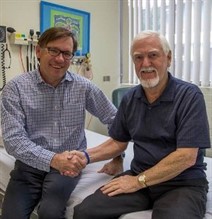Clostridium difficile Toxoid Vaccine Study
Clostridium difficile (C. diff) is a very common bacterium that is responsible for up to 30 per cent of all diarrhoea cases among hospitalised patients. The incidence is also increasing among people with recent healthcare contact living in the community. Severe complications include perforation (rupture) of the bowel and death.
C. diff can cause no symptoms in some patients, which is referred to as colonisation. Once colonised with the bacteria, patients with C. diff shed spores in their faeces and can transmit the bacterial spores to the environment, other patients and health care workers. At this time, there are no licensed vaccines available that can prevent C.diff.
The Vaccine Trials Group is conducting a trial of a vaccine against C.diff in at-risk individuals. Recruitment for the study began in 2013 and is now closed in WA but continues at other sites in Australia and internationally. Potential participants were identified as being at risk of developing C.diff and had either been hospitalised twice in the previous 12 months or were awaiting surgery with a planned hospital stay of at least three days.
Approximately 15,000 people are expected to participate in this trial at around 200 study sites around the world. There are currently 8,717 participants enrolled in the study globally, with 148 of those within Australia. The Vaccine Trials Group have enrolled 33 participants into the study and has 25 participants who have not yet completed the study.
For most people, active participation has been for only two months, with regular follow-up until the end of their three-year study participation. After the initial clinic visits and vaccination stage, the most important part of the study is the ongoing surveillance for evidence of C.diff infection amongst volunteers.
We are very grateful for the diligence of our participants and their willingness to maintain contact with us for such an extended period – even while travelling overseas! The researchers rely on the cooperation of study participants for good quality information and a successful study outcome. The first of our Clostridium difficile Toxoid Vaccine Study participants completed their involvement in the study in mid-2017 and the final participant visit is anticipated in mid-2019.

Febrile Seizure Follow Up Study
Febrile seizures (FS) are common in children aged six months to six years, peaking in the second year of life and triggered by a sudden change in temperature. The aim of this study is to determine the clinical and developmental outcome of children who had a FS when they were aged two years or younger, and to look for specific genetic markers that may be linked to why the child had a FS. This will be compared to children without a history of FS.
Study recruitment was completed in March 2017. A total of 269 children aged 12 – 42 months were recruited from paediatric hospitals in Sydney, Melbourne, Adelaide and Perth. Data and specimen analysis is currently in progress. Results of this study will potentially have considerable bearing for vaccination programs and vaccine safety assessment both nationally and internationally.
TESTOVPneumo and PneumoWA
Princess Margaret Hospital is one of 12 tertiary hospitals around Australia involved in Pneumonia studies. We are looking at what causes pneumonia and the rare complications including fluid surrounding the lung, called an empyema.
The aims of these studies are to understand more about what causes pneumonia and empyema in children across Australia and how effective current vaccination against is. This will help make decisions about what vaccinations children in the future should have to potentially prevent pneumonia and other diseases caused by bacteria. If the study finds that many children suffer from infections from a certain type of bug, a new vaccine may be selected for use in Australia to prevent these infections. This could help keep your child and other children in your community stay healthy in the future. To date, across all sites, we are 750+ recruits which is great, although we still have a way to go for our target of 2,200 children!
176 children with pneumonia were recruited at Princess Margaret Hospital up to December 2016. There were 87 male and 88 female children with pneumonia; the average age of recruited children was 3.5 years. Laboratory investigations identified 15 pneumococcus serotypes, including 13 new serotypes that are not part of the current pneumococcal vaccine. In addition, pneumococcus and respiratory viruses were identified in 27 per cent and 60 per cent of pneumonia cases, respectively. This is particularly interesting, as the results are already proving what we suspected in a small sample of the target group.
Mejbah Bhuiyan, PhD student with the Vaccine Trials Group presented some initial findings at the Public Health Association Australia conference in June 2017.
Cases of pneumonia or an empyema are recruited through the hospitals. We are however seeking healthy children under 18 years of age for comparison. If you are interested in your child joining the study, please contact vtg@telethonkids.org.au or 9340 8542.
